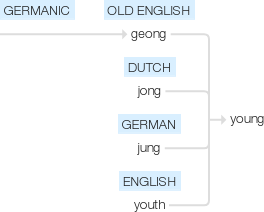Young
Old English g(e)ong, of Germanic origin; related to Dutch jong and German jung, also to youth; from an Indo-European root shared by Latin juvenis .
wiktionary
Inherited from Middle English yong, yonge, from Old English ġeong, from Proto-West Germanic *jung, from Proto-Germanic *jungaz, from Proto-Indo-European *h₂yuh₁n̥ḱós, from *h₂yuh₁en-(“young”).
etymonline
young (adj.)
Old English geong "youthful, young; recent, new, fresh," from Proto-Germanic *junga- (source also of Old Saxon and Old Frisian jung, Old Norse ungr, Middle Dutch jonc, Dutch jong, Old High German and German jung, Gothic juggs), from PIE *yuwn-ko-, suffixed form of root *yeu- "vital force, youthful vigor" (source also of Sanskrit yuvan- "young; young man;" Avestan yuuanem, yunam "youth," yoista- "youngest;" Latin juvenis "young," iunior "younger, more young;" Lithuanian jaunas, Old Church Slavonic junu, Russian junyj "young," Old Irish oac, Welsh ieuanc "young").
From c. 1830-1850, Young France, Young Italy, etc., were loosely applied to "republican agitators" in various monarchies; also, especially in Young England, Young America, used generally for "typical young person of the nation." For Young Turk, see Turk.
young (n.)
"young animals collectively, offspring," late 15c., from young (adj.).
